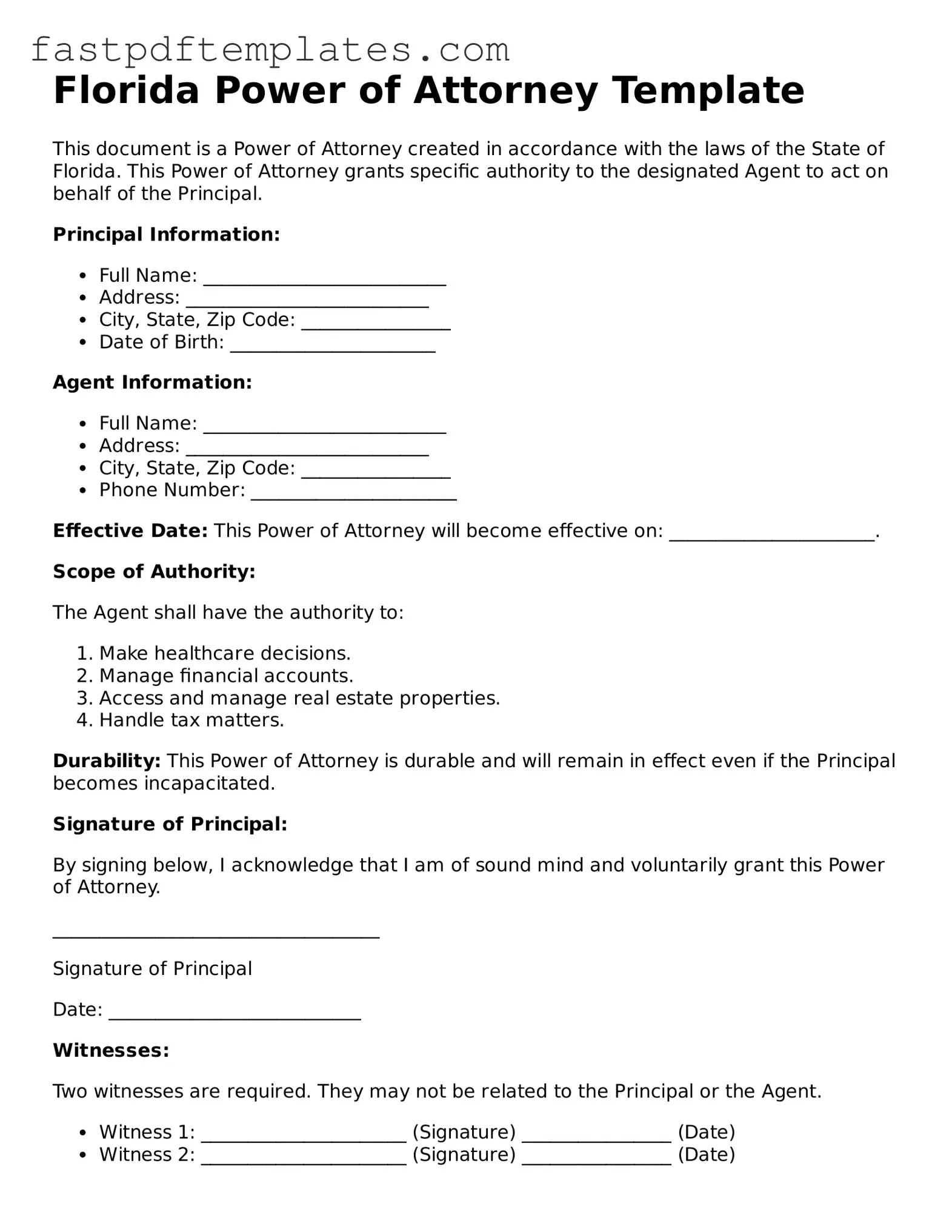The Florida Power of Attorney (POA) form is a legal document that allows one person to act on behalf of another in legal or financial matters. Similar to a POA, a Health Care Proxy grants someone the authority to make medical decisions for another individual when they are unable to do so. This document is particularly important in situations where a person is incapacitated and cannot communicate their wishes regarding medical treatment. The Health Care Proxy ensures that a trusted individual can advocate for the patient’s health care preferences, making it a vital tool for ensuring that one’s medical decisions align with their values and desires.
Another document that shares similarities with the Florida Power of Attorney is the Living Will. While a POA can cover a broad range of financial and legal matters, a Living Will specifically addresses end-of-life medical decisions. It allows individuals to express their wishes regarding life-sustaining treatments and interventions in situations where they may be terminally ill or in a persistent vegetative state. This document serves as a guide for healthcare providers and family members, ensuring that a person's preferences are honored during critical moments.
A Durable Power of Attorney is another closely related document. It functions similarly to a standard Power of Attorney but remains effective even if the principal becomes incapacitated. This durability is crucial for individuals who want to ensure that their financial and legal affairs are managed seamlessly, even if they can no longer make decisions themselves. By designating a trusted agent through a Durable Power of Attorney, individuals can maintain control over their affairs, providing peace of mind for themselves and their loved ones.
The Springing Power of Attorney is yet another variant. This document only becomes effective under specific conditions, typically when the principal becomes incapacitated. This type of POA can be particularly appealing for those who want to maintain control over their affairs while they are still capable of making decisions. It ensures that the appointed agent only steps in when truly necessary, providing a safeguard against potential misuse of authority.
A Trust is a legal arrangement that allows one person (the trustee) to hold assets for the benefit of another (the beneficiary). While a Power of Attorney allows someone to act on behalf of another in various matters, a Trust is specifically designed for asset management and distribution. Trusts can help avoid probate, provide tax benefits, and ensure that assets are managed according to the grantor's wishes. Both documents serve to protect individuals’ interests, but they do so in different ways.
A Guardianship is a legal relationship where a court appoints an individual to make decisions for someone who is unable to care for themselves. This can occur when a person is mentally incapacitated or a minor child needs a responsible adult to oversee their welfare. While a Power of Attorney allows individuals to designate their own agents, a Guardianship requires court intervention. Both serve to protect individuals, but the processes and levels of oversight differ significantly.
The Assignment of Benefits (AOB) is another document that can be compared to a Power of Attorney. An AOB allows a policyholder to transfer their insurance benefits to a third party, typically a contractor or service provider, to handle claims directly with the insurance company. This is common in home repair or medical services. Like a POA, it involves granting authority to another party, but it is specifically focused on insurance claims and benefits management.
Finally, a Financial Power of Attorney is a specific type of POA that focuses solely on financial matters. This document allows an agent to manage the principal's financial affairs, such as paying bills, managing investments, and filing taxes. While a general Power of Attorney can cover a wide array of decisions, a Financial Power of Attorney is tailored to address the complexities of financial management. This distinction is important for individuals who want to ensure that their finances are handled appropriately, especially during times of incapacity.

